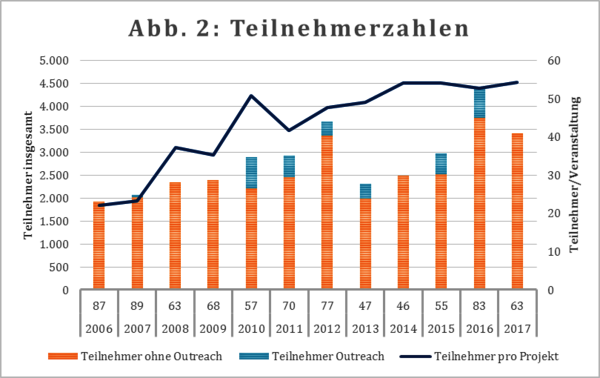2017 Annual Report
The surprising victory of Donald Trump in the U.S. Presidential election and the start of the new administration has shaped the work of the Atlantic Academy this year.
Through a multitude of events, we have dedicated ourselves to the new U.S. government in its first weeks and months and have gone in search of clues identifying its political structure. There was and is a widespread skepticism (bordering on) rejection of the new U.S. President. A Pew Research Center study from June of this year shows this impression. In 2016, about 77 percent of those interviewed in European partner states had trust in the U.S. President. This trust dropped about 60 points in the following year to only 17 percent. At the same time however, the positive views of the USA fortunately did not sink to the same degree (2016: 64 Percent; 2017: 48 Percent).
We can personally confirm these two results as far as possible from our work this year. While the attitude towards the Trump administration, in terms of its personal and political decisions, mostly manifests itself in incomprehension and rejection, interest in U.S. domestic and foreign policy remains unbroken. Therefore the work of the Atlantic Academy is already proving to be more important now than ever, especially given an allegedly unpredictable administration as well as a stressed transatlantic relationship. In contrast to this turmoil, the Academy offers a steady and tightly increasing exchange between the people of Rhineland-Palatinate and Americans living in our state. This is particularly so in the scope of our affiliate projects like “Welcome to Rhineland-Palatinate! Our Neighbors from America.”
But beyond the nearly hourly news coming from the Trump administration, we have also given attention to other themes that relate closely to our programmatic teachings. These topics included, but were not limited to, the problems of domestic violence, the inner structure of the U.S., the roll of minorities and citizenship, the challenges of populist movements in the U.S. and Europe, and the anti-Americanism in Germany. We also discussed the possibilities of social entrepreneurship, the roll of LGBTIQ movements in the U.S., and the past and present-state of the U.S. healthcare system.
In these programs, we benefitted greatly from working with the network of German-American Institutes and the associated speaker programs of the U.S. Embassy, the U.S. Consulate General in Frankfurt, and the German American Institutes Initiative. Thanks to this cooperation, we had the opportunity in 2017 to bring a total of fifteen American speakers to our programs in Rhineland-Palatinate.
In terms of cultural programs, we organized art student exhibitions from the Department of Defense DependentSchool in cooperation with the Overseas Art Education Association as well as an event at national parks in the U.S.
We also supported the Hunsrück-Hochwald National Park organization’s second Jubilee event.
A high point of the past project year had to do again with the Trump administration and dealt with the financial statement of the administration after its first 100 days. Nearly 200 guests accepted an invitation to the Mainz Hilton Hotel for a podium discussion moderated by HR-Journalist Isabel Reifenrath. Panelists included the journalist Dr. Christoph von Marschall, the U.S.-Representative of the Friedrich-Naumann Stiftung Claus Gramckow, and the Director of the Atlantic Academy Dr. David Sirakov.
Wide Event Offerings and Great Interest
In the 2017 project year, Atlantic Academy has undertaken 63 projects so far, five of them workshops, two symposiums, one exhibit, numerous seminars and podium discussions as well as our project “Welcome to Rhineland-Palatinate.” With these projects, we have reached 3,417 participants. This is the highest participant number in the history of the Atlantic Academy outside of presidential election years (see Figure 1).
Excluding school workshops, the Atlantic Academy would have led 58 projects this year. We continue to succeed by keeping individual project costs low. In figure 2, the pictured rise in project costs made a generous grant by the U.S. Embassy possible.
Our Cooperation Partners
Recognizing that excellent political education can only be presently achieved through broad cooperation and challenge-sharing, 2017 is not that different from previous years. The Atlantic Academy worked together with 46 partners in the conception, organization, and execution of projects throughout this program year. Among the most important partners are the U.S. Embassy, the U.S. Consulate General Frankfurt am Main, various institutions of the Kaiserslautern Technical University (TU), the Ingelheim Training Center, and the Kaiserslautern European Direct Information Center.
We gained new cooperation partners in the Kaiserslautern University Campus Culture, the Koblenz Chamber of Commerce and Industry, the University of Mainz Institute for Entrepreneurship, and the Founding Initiative Rhineland-Palatinate, among others.
In 2017, funding from the Federal Agency for Civic Education (German: BpB) as well as the state headquarters for political education in Hesse and Rhineland-Palatinate was maintained. Because we successfully applied in the previous year for a large grant from the U.S. Embassy for projects and infrastructure aid, our proposal was approved for the U.S. fiscal year from October 2017 to September 2018.
Topics and Impressions
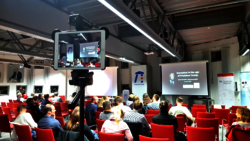
In order to offer you a glimpse at the many facets of our projects, here are a few themes and impressions.
The Atlantic Academy started the 2017 program year with the series, “Atlantic Forum,” done in cooperation with TU Kaiserslautern Political Science II. In the first forum, Dr. Steffen Hagemann of TU Kaiserslautern dedicated himself to questions of solidarity with Israel and the United States-Israel special relationship. With a total of six forums, we reached 338 interested people, on average 60 per forum. In addition to Dr. Hagemann’s talk, the topics for 2017 were the American Healthcare System and the Crisis of Democracies (Dr. Curd Knüpfer, FU Berlin), the Relationship Between Turkey and the U.S. (Dr. Hakan Akbulut, Vienna University), Polarization in U.S. Congress (Prof. Sean Theriault, University of Texas, Austin), Journalism and Media in The Time of Trump (Prof. Damian Radcliffe, University of Oregon, Eugene), and North Korea and the U.S. (Dr. Alexandra Sakaki, SWP Berlin).
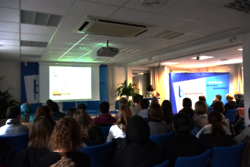
In collaboration with the Ingelheim Fridtjof Nansen Academy, the Hessian State Center and the U.S. Consulate General Frankfurt, the Atlantic Academy devoted itself to African-American history and current standing in the political culture of the United States.
At this event, we welcomed Dr. Melanye Price from Rutgers University. She also talked at a co-event with the Mainz Center for Political Education about the subject “The Race Whisperer: Barack Obama and the Political Use of Race.”
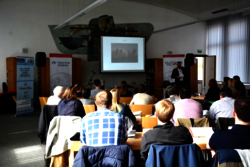
Together with the German Association for Political Education Rhineland-Palatinate,we led a teaching seminar with the theme “Present and Future of the U.S. Foreign and Security Policy.” Alongside interesting talks about the institutional ideals and principles of American foreign and security policy, there was a trip to the Ramstein Air Base.
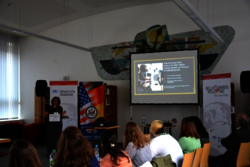
At the kick-off of our successful series “Brown Bag Luncheon on Entrepreneurship,” the chances and challenges for companies in the digital age was front and center. Professor Melissa S. Fisher from New York University impressively showed why, in spite of the creative potential of women in innovative industrial work areas, the majority of start-ups are founded by men. She also discussed the changes that improve company work environments.
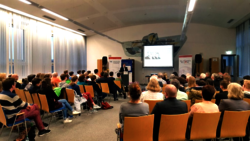
In light of the success of populist movements, candidates, and parties in the U.S. and Europe, the Director of the Atlantic Academy Dr. Sirakov spoke at an event in cooperation with the Europe Direct Information Center Kaiserslauternabout the challenges of these changes. The large number of attendants showed that these themes are on the minds of Kaiserslautern residents.
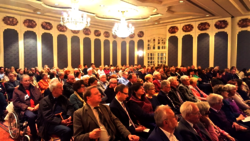
With more than 200 interested citizens, our podium discussion titled “What’s the Deal, Mr. Trump? An Overview of the first 100 Days” in the Mainz Hilton Hotel was the most visited event of the year. Dr. Christoph von Marschall of the Tageszeitung, Claus Gramckow from the Friedrich-NaumannFoundation in Washington, D.C., and Dr. David Sirakov from the Atlantic Academy tried to rate the bumpy start of the Trump Administration. Isabel Reifenrath from the Hessischen Rundfunk moderated the evening.
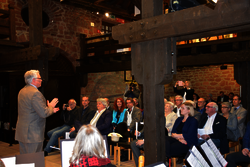
The Trump administration’s early foreign policy and perspectives on the transatlantic relationship has given repeated cause for concern. It was therefore all the more important that James W. Herman from the U.S. Consulate General Frankfurt came to Kaiserslautern. He spoke about these trying times at an event in cooperation with the European Union Kaiserslautern, the Volkshochschule Kaiserslautern, and the Europe Direct Information Center Kaiserslautern. And he managed all of it while speaking German.
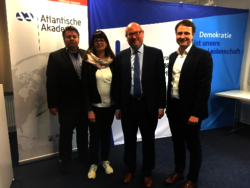
Relationships with the U.S. as well as the conception of the western world and its relationship with Russia were themes at an event with the National Center for Political Education. Dr. Michael Kimmage from the Catholic University of America in Washington, D.C. created scenarios for the future relationship between transatlantic powers and Russia. His main take-away: “Transatlantic unity is central for the future relationship between the West and Russia.”
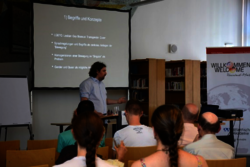
Keeping with current developments and the gay marriage vote in Germany, Professor Martin Lüthe from FU Berlin’s John F. Kennedy Institute gave fascinating insight into the history of American LGBTIQ movements. He explained how the important work and achievements of the LGBTQ community in the U.S., such as the Stonewall Riots in the summer of 1969, the abolition of “Don’t Ask, Don’t Tell” in the American military in 2011, and the Supreme Court ruling on same sex marriage in 2015 are now in doubt under President Trump.
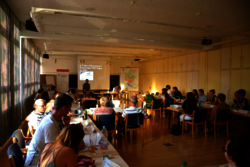
The flagship of the Atlantic Academy, the “Summer School,” dedicated itself this year to questions of whether we are dealing with an unprecedented presidency. In five intensive seminars, participants discussed political dealings of the new president and his impact on U.S. domestic and foreign politics. In contrast to the many messages from the White House, it is not surprising that the Summer School was booked way before the deadline. The financial support of the U.S. Embassy made it possible for us to admit more participants than the previous year.
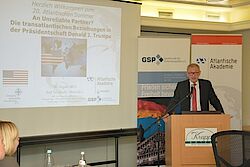
How predictable is the American partner? This question was at the center of our 20th Atlantic Summer in Bad Neuenahr/Ahrweiler. The seminar dealt in detail with foreign and security policy under President Trump, transatlantic trade relations, and common challenges in the transatlantic area during the age of fake news and social media.
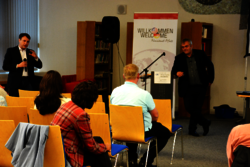
Elections in the U.S. are not only important to our German audience. This year's Bundestag election also attracted the interest of not only Germans, but also the Americans who live in our state. To give them an insight into the German political and electoral system, we invited them to an English-language event titled “Parties, Candidates, Issues: Germany in an Election Year.”
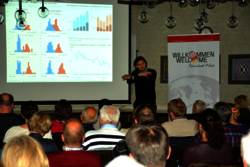
With generous support from the US Embassy, the AA, and the project WiR!, we were able to hold a lecture series with stops in Ramstein, Baumholder, and Speicher. Gordon Friedrichs of the Ruprecht-Karls University of Heidelberg gave insight into the basic domestic and social factors for the design and legitimacy of U.S. foreign and security policy. Above all, political polarization in the U.S., which has been increasing for decades, has been identified as the decisive driving force behind the changing role of foreign policy in Trump's presidency.
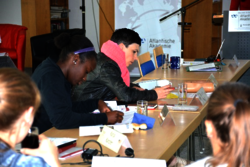
Despite, or precisely because of, Hillary Clinton's defeat in the 2016 U.S. election campaign, the American women's movement is currently more visible, louder, and more active than it ever was under Barack Obama. In our seminar “Shattered Ceilings? Women in American Politics,” the predominantly young, mostly female student-participants spent two days discussing the representation of women in politics, feminism in American TV shows, contentious social issues such as abortion, and the latest developments in the women's movement. A total of eleven participants and four speakers exchanged views on the situation in the U.S. while also drawing parallels to the development of the women's movement and feminist issues in Germany. A grant from the U.S. Consulate General supported the participation of ten interested parties.
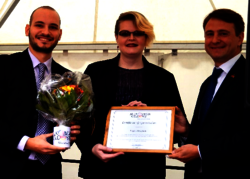
In connection with German-American Day, which we celebrated alongside the 10th birthday of the Docu Center Ramstein and in cooperation with the German-American International Women’s Club, three volunteers were recognized for their engagement by the coordinator of the WiR! Project, John Constance, and the director of the AA, Dr. David Sirakov.
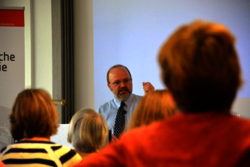
William Pierce, the current director of APCO International and senior spokesperson for the U.S. Department of Health and Human Services under President George W. Bush, gave an interesting look into the U.S. health care system’s history, development, and current form. The U.S. Embassy made this program possible. It took place at the Obama Institute for Transnational American Studies, an institute of the University of Mainz.
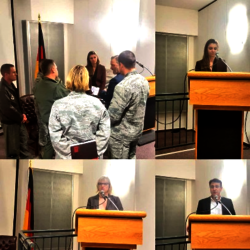
Laura Daniels from the Global Public Policy Institute in Berlin offered an extremely exciting look into two related topics: the historical procedures of the intelligence agencies from former Warsaw Pact states and the lessons that Russia’s contemporary secret services have learned from its predecessors. The AA, together with the public affairs department of the U.S. Air Force Headquarters, presented a lecture titled "Shielding Democracies from Outside Interference" at Ramstein Air Base. The program attracted the interest of 80 members of the U.S. and NATO forces.
The Staff of the Atlantic Academy - Sought-After Expertise
As knowledgeable speakers in matters of U.S. and transatlantic relations, the staff of the Atlantic Academy were again in demand this year.
The director of the AA gave lectures in many places, including Stromberg, Koblenz, Mainz, and Langenlonsheim. In Neustadt, the topic was “Unprecedented: Causes and Consequences of the U.S. Presidential and Congressional Elections on Transatlantic Relations.” The speech was delivered for the parliamentary evening hosted by the Palatinate branch of the German Journalists Association. Another highlight was Dr. Sirakov’s lecture at the European Academy Otzenhausen, titled “European Spring Academy 2017: The EU and its Relations to the US.” The lecture covered the past, present, and future of transatlantic relations. Additionally, he gave the keynote address "The Rise and Challenges of Authoritarian Populism in Europe and the U.S." at the July 4th celebration of the Obama Institute for Transnational American Studies. He also participated in podium discussions on the presidency of Donald J. Trump and the future of transatlantic relations. These discussions took place at many locations and occasions, including the Annual Meeting of the Clausewitz Society in Hamburg and at the annual meeting of the European People's Party (EPP) in Wicklow, Ireland.
Education Manager Sarah Wagner spoke at a South Carolina travel preparation seminar organized by the State Pedagogical Institute in Speyer on "Palmetto Politics" as well as at a seminar organized by the Continuing Education Center in Ingelheim on the Trump administration’s immigration policies.
Special Project: "Welcome to Rheinland-Pfalz - Our Neighbors from America"
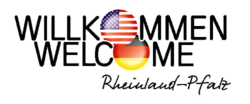
The Atlantic Academy Rhineland-Palatinate enjoyed the continued success with its project "Welcome to Rhineland-Palatinate! Our Neighbors from America [WiR],” an initiative that began in 2016.
As part of the project's continuation in 2017, online English-language information and interaction channels were expanded on the WiR! website (www.welcome-to-rlp.org). This expansion allowed us to correct a gap in online services for the community of internet-connected U.S. households.
With the help of intensive public relations work, we were able to successfully and sustainably reach U.S. families in the Rhineland-Palatinate community, thus increasing the awareness of existing resources available to military personnel. Strong signs of support from our U.S. partners included pinning the various WiR! offerings on the official websites of the military bases and thorough positive coverage in relevant U.S.-military media.
All signs point to the continuation of these positive developments going into 2018. Our focus is further developing and merging local activities in order to strengthen an open German-American community. Consequently, as part of the continuation and further development of the WiR! Project in 2018, wider-reaching goals have been set in various areas. Cooperation with the target communities should foster additional synergy effects with the help of a “Best Practice” forum. In addition, efforts will be made to increase the number of target communities and improve the publicity of local integration measures. Keeping in mind cooperation with our US partners, we aim to include WiR! offerings in the information distributed by military institutions. As for our online services, we have our sights set on the further development of the WiR! website, an increase in outreach on Facebook (@WelcometoRLP), and the development and maintenance of an Instagram account.
Publications: "Atlantic Texts" and "Atlantic Topics"
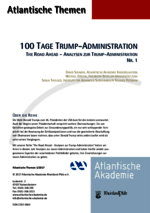
As of last year, the Academy had already developed the online series “The Atlantic Academy's Road to the US. Elections,” a supplement to "Atlantic Themes," which covers American domestic, foreign, and economic policy developments. This year, we devoted two of our issues to the activities of the Trump administration after the first 100 and 200 days. These issues analyzed the general state of the new government, developments in the Supreme Court, energy policy, civil-military relations, and the crisis of foreign policy confidence.
Social Networks and our Website: The Atlantic Academy in the Digital World
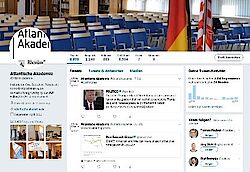
Also this year, the Atlantic Academy continued and expanded its engagement in major social networks such as Twitter (@AtlantAkademie) and Facebook (@AtlantischeAkademie). Our number of followers has also continued to increase. The major role of Twitter in the communications of the incumbent U.S. President has also brought greater attention to our online work. The publication Rheinpfalz covered this topic in a comprehensive article about our social media coordinator, Sarah Wagner. In order to better appeal to younger audiences with representations of our diverse work, we have also been active on Instagram (atlantischeakademie) since this year.
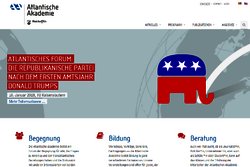
Our new website design has been enjoying growing popularity. Now that we collect statistical data, we are in a better position to evaluate and improve the efficiency of our information dissemination. Since the statistics module was launched in March 2017, around 9,000 people have visited our website and clicked over 25,000 times. After the activation of our English-language pages, more and more Americans are now browsing the various offers of the Academy.
The special position of the Atlantic Academy in the various American networks in Germany enables us to continuously bring outstanding speakers to Rhineland-Palatinate. In order to make choice presentations available to an even wider audience, we will launch our YouTube channel within the next year. Videos of various presentations will be available there. The kick-off will be given by Damian Radcliffe, the Carolyn S. Chambers professor of journalism at the University of Oregon. His lecture will be titled “Journalism and the Media in the Age of Trump.”
Press Work of the Atlantic Academy
The comprehensive media coverage of the U.S. presidential and congressional elections has shown no signs of stopping.
In the field of print media, several interviews with the director and the education officer as well as behind-the-scenes reports have appeared in the Rhine Newspaper, the Trierische Volksfreund, the Rheinpfalz, the Mannheim Morning, the Newspaper of Mainz, and various German Press Agency reports. Similar content has also been published by the online news portals web.de and gmx.de, and interviews with Dr. Sirakov have appeared on radio and TV stations such as Südwestrundfunk and ZDF (Logo! News for Children).
New Challenges and Opportunities for the Atlantic Academy
Once again, a successful program year is behind us and the goals for the coming year are set.
So far, 46 projects are planned for the coming year, in which we will continue our coverage of cultural, social, and economic policy, as well as provide insights into the Trump administration and its decisions on domestic, foreign, and security policy. We will balance our attention between reports on Trump’s first year in office and predications about the midterm elections in November. We hope that Rhineland-Palatinate’s population will continue to display a high level of interest in the U.S., often but not necessarily because of the large U.S. presence in our state. Unfortunately, possible further strains in the transatlantic relationship pose a major challenge for institutions such as the Atlantic Academy.
In these challenging times, we remain convinced of the necessity of our mission: that we must keep all lines of transatlantic dialogue open and, through our work, preserve our connection with our partner, America.


